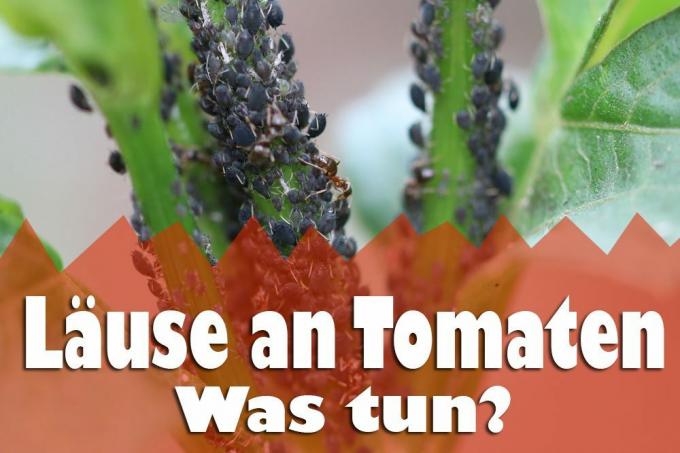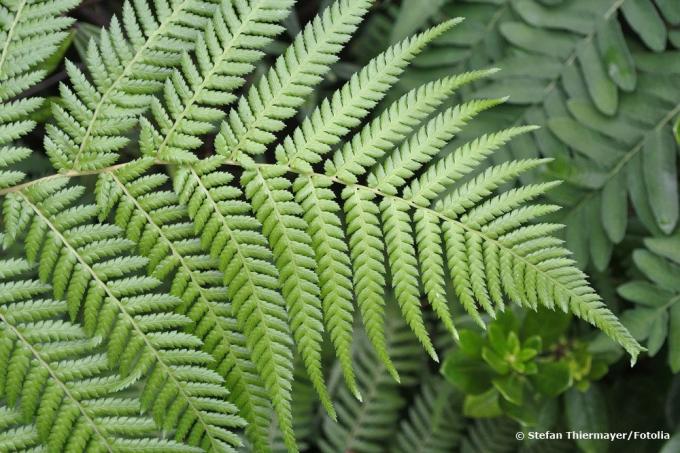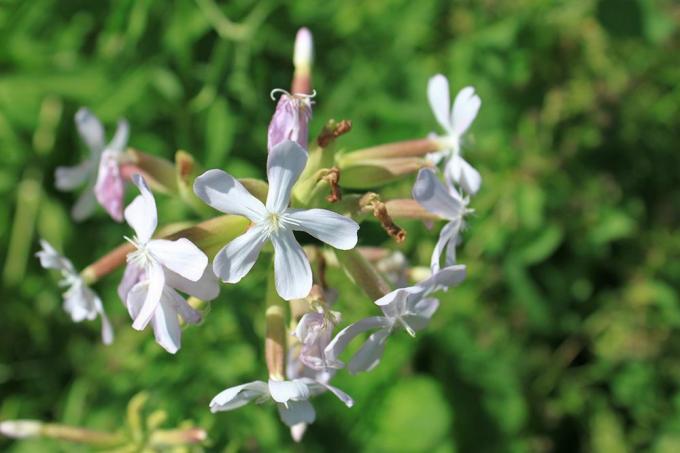
table of contents
- Home remedies for aphids on tomatoes
- 1. Effective: soapy water
- 2. Baking soda
- Effective plant extracts in lice
- 3. bracken
- 4. Nettle
- 5. Tansy (wormweed)
- 6. Soapwort
- 7. Wormwood
Lice on tomatoes are a real problem, especially since they multiply quickly and act quickly is therefore essential. In this article you will find out how and with which self-made pesticides you can get rid of the annoying pests.
Home remedies for aphids on tomatoes
Plant lice such as aphids can do a lot of damage in the garden. The hungry little animals attack numerous plants, multiply rapidly and weaken their hosts considerably. Fortunately, there are a number of good home remedies that can be used as sprays to fight lice.
1. Effective: soapy water
Probably one of the most effective sprays against aphids is a simple soapy solution, which you make from non-potash soap or soap. Simply mix a tablespoon of soap (liquid or finely grated) with a liter of water and stir until the soap has dissolved. Now you can use them as a spray. The agent leaves a fine film on the leaves of the tomato, which prevents the lice from breathing. Alternatively, neem (or neem) is also very suitable, which you can purchase as a tincture or powder in stores.

2. Baking soda
Dissolve half a teaspoon of baking soda (for example baking soda or baking soda) in one liter of lukewarm water, pour the mixture into a spray container and thoroughly spray the lice-infested tomato plants. Incidentally, baking powder is not suitable for this purpose, as it usually does not contain baking soda.

Tip: So that you actually get rid of the lice, you should do the spraying - no matter which agent you choose - several times at intervals of a few days. You can also use it to catch the lice that have just hatched and escaped during the previous spraying.
Effective plant extracts in lice
The garden and nature also produce some plants with effective ingredients that are of great help in getting rid of aphids. Plant manure is particularly helpful, in which the collected plant parts are fermented for several days in spring or rain water.
3. bracken
Fermented fern manure is an excellent remedy for lice on tomatoes and works in several ways: On the one hand, it helps it as a spray treatment against all types of aphids, on the other hand it is a good one due to its high phosphorus content Organic fertilizer. For a higher nitrogen supply, you can use a handful of freshly picked nettle leaves, especially since these are also very effective against plant lice.

It is best to prepare the liquid manure with bracken, the large, green fronds of which you collect on the more acidic forest soil. If possible, cut only the young fronds, but leave the thick, older ones. The best time for this is June, when you can also dry the herb (for example, loosely bundled in the air) and keep it in stock for later use.
How to prepare the fern manure:
- Cut a kilogram of fresh fronds as finely as possible
- fill in a plastic bucket
- Fill up with ten liters of water (spring or rain water)
- then stir carefully
- put in a warm and dark place
- then with jute, a lattice, etc. ä. cover, but must be ventilated
- stir daily
- The fermentation process is over after 12 to 14 days
The fermentation process is complete as soon as no more bubbles rise. Now you can filter the liquid and fill it into canisters, for example. Well closed, it can be kept for about a week.
Use of fern manure:
- Mix the fern manure with rainwater.
- The ideal ratio is 1:20.
- So there is one liter of water for every 50 milliliters of liquid manure.
- Add a teaspoon of soft soap for better adhesion.
- Mix well and pour into a spray bottle.
- Spray tomato plants as early as possible in the morning.
Before an impending downpour you should never spray tomatoes in the field, as the rain quickly washes the agent off the leaves again and thus remains ineffective. Incidentally, this also applies to other sprays.
Tip: Fermented manure usually stinks badly. However, you can mitigate the unpleasant smell by adding a handful of rock flour when preparing the mixture.
4. Nettle
Even Nettle manure works excellently against aphids and also has the advantage of being a very good fertilizer for tomatoes. The remedy is rich in nitrogen, mineral salts and trace elements. The production and use of the manure works as described for the fern manure, but you only have to let this mixture ferment for eight to a maximum of ten days. If possible, use young leaves and stems that you cut before flowering. If you have liquid manure left over after spraying, it will help your compost to decompose.

5. Tansy (wormweed)
With its fine, light green leaves and intense smell, the tansy (bot. Tanacetum vulgare) has always been used as a natural pesticide in the home garden. It blooms all summer and is easy to recognize by its yellow, firm flower heads. Against aphids, the tansy has a preventive, less combative effect. So use the fermented extract primarily to protect the tomatoes or tomatoes. in the case of a minor infestation.

And this is how you produce the plant protection product:
- Cut a kilogram of fresh flowers and leaves.
- Shred the material as finely as possible.
- Cover it with ten liters of spring or rain water.
- Let it ferment as described for eight to ten days.
Then dilute the liquid manure in a ratio of 1:10 with water and spray the tomato plants.
Tip: An infusion of tansy flowers (100 grams per liter of water) helps very well against fungal diseases such as downy mildew or rust.
6. Soapwort
Soapwort (bot. Saponaria officialis) has its name for a reason. The pretty plant with the violet, fragrant flower clusters is one of the classic representatives of the cottage garden, because before Its roots in particular contain abundant saponins and were therefore used by our ancestors for washing bodies and clothes used. However, fermented soapwort extract is also great for combating lice on tomatoes and other garden plants.

If you want to grow the soapwort in the garden, give it a sunny spot with plenty of space. Don't forget to dig in root barriers as well, as the plant spreads over wide rhizomes. Otherwise, you can often find them growing wild in ditches and near rivers. A fermented extract that is produced in the same way as described for bracken manure is very effective against lice:
- one kilogram of fresh leaves and flowers
- Cut as finely as possible
- and pour ten liters of spring or rain water on it
- Let it ferment for eight to ten days
- apply immediately
For use, dilute the extract in a ratio of 1:10 with water.
Tip: Ivy leaves and horse chestnuts also contain saponins and can therefore be used as an infusion against aphids. However, ivy leaves are poisonous and are therefore not suitable for vegetables such as tomatoes.
7. Wormwood
Wormwood is also very suitable for combating annoying lice on tomatoes. The strong fragrances of the various Artemisia species have a disruptive effect on the lice, which is why spraying the agent even has a preventive effect. The best-known types, which are also suitable for a preparation for fermented plant extract, are:
- Artemisia absinthium: common wormwood, greyish color and very lush growing
- A. alba: dark green color, shrub-like growth
- A. abrotanum: also known as rowan
- A. annua: annual mugwort

You can grow these and other types of wormwood in the garden or collect them while walking through nature. All can be found mainly on dry and well drained soils. For an effective anti-lice remedy, place two kilograms of freshly cut leaves and flowers, chopped as finely as possible, in ten liters of water for eight to ten days. Let the mixture ferment as described for the fern manure and then spray it on the infected tomatoes diluted with water in a ratio of 1: 5.



